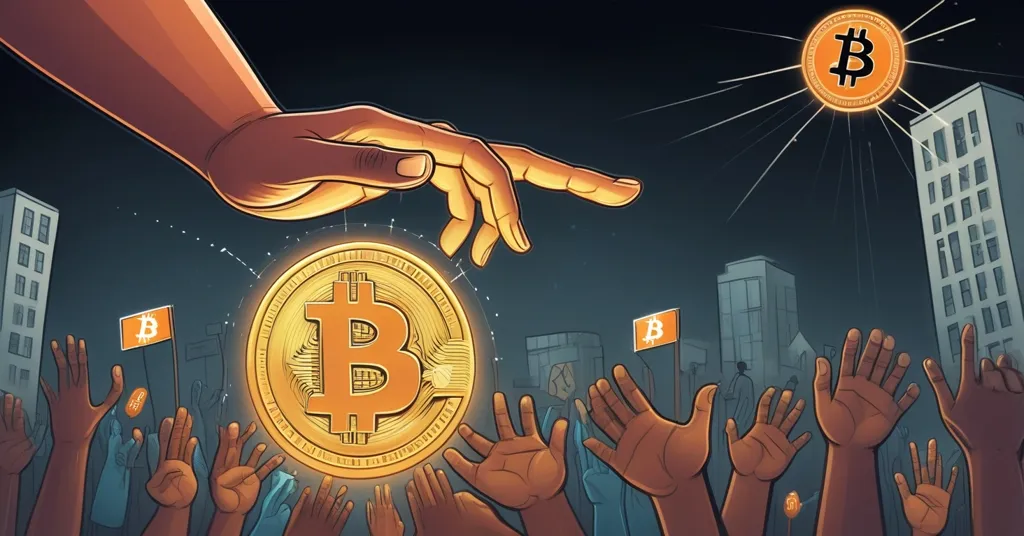Jack Dorsey Warns: Institutional Capture Threatens Bitcoin’s Core Principles

Jack Dorsey Warns of Bitcoin’s Institutional Capture Risk
Jack Dorsey, CEO of Block and former Twitter CEO, recently voiced concerns about the potential institutional capture of Bitcoin during an interview at San Francisco’s Presidio Bitcoin workspace. He highlighted the risks posed by the increasing involvement of major financial institutions like BlackRock, which could undermine Bitcoin’s open and permissionless nature. Dorsey emphasized the importance of Bitcoin’s use in everyday payments to maintain its relevance, rather than solely as a store of value. He also advocated for continued open-source development and experimentation beyond the Lightning Network, suggesting that Bitcoin’s future depends on fostering a diverse ecosystem of applications and community-driven projects.
- Institutional capture threatens Bitcoin’s open ethos.
- Bitcoin’s relevance depends on everyday payments.
- Open-source development and experimentation are crucial.
The Threat of Institutional Capture
Institutional capture refers to the potential for large financial institutions to influence or control Bitcoin, which could undermine its decentralized and permissionless nature. Dorsey acknowledged that while institutional investment in Bitcoin is inevitable, it could pose a threat to its core principles. “It probably harms it a bit,” he remarked, reflecting on the impact of such investments.
He emphasized the importance of Bitcoin’s permissionless nature, which allows anyone to build on it without needing permission from institutions.
“To be able to work on a system for sending and receiving money that’s entirely open […] that has converted the likes of a BlackRock or these major institutions that we railed against in the past—and now they have to turn their attention to it—and yet you still don’t need their permission to build on it […] where else can you find that?”
Dorsey’s words underscore the unique value proposition of Bitcoin.
However, not everyone agrees with Dorsey’s concerns. Some argue that institutional involvement could bring increased liquidity and mainstream adoption, potentially benefiting Bitcoin’s growth. Yet, Dorsey’s worry is that this could lead to a shift away from Bitcoin’s founding principles, making it more akin to traditional financial systems.
Bitcoin’s Everyday Use
Dorsey warned that Bitcoin might become irrelevant if it focuses solely on being a store of value.
“I think it fails through irreverence—like it just fails to be relevant to people on a daily basis,”
he stated. He believes that for Bitcoin to maintain its relevance, it must be used for everyday payments.
“If it just ends up being store of value and nothing more, I don’t think it gains relevance at all. I think it has to be payments for it to be relevant on the everyday.”
Block, under Dorsey’s leadership, is actively working to strengthen Bitcoin’s infrastructure. Projects include an open-source mining rig and chipset, the Bitkey self-custodial wallet, and integrating BTC into Cash App. These initiatives aim to support Bitcoin’s growth and utility, aligning with Dorsey’s vision of fostering a diverse ecosystem of applications and community-driven projects.
While Dorsey’s focus on everyday payments aligns with Bitcoin’s original vision as a medium of exchange, there’s a counterpoint within the community. Some, like Bitcoin Keeper Lead Developer Ben Kaufman, argue that Bitcoin is more needed as a store of value than a means of payment. This debate highlights the diverse perspectives on Bitcoin’s future role.
Supporting Open-Source Development
Dorsey also encouraged more experimentation with Layer 2 solutions beyond the Lightning Network.
“I think we can do better than Lightning,”
he said, advocating for a broader approach to scaling Bitcoin. Layer 2 solutions are technologies built on top of Bitcoin to improve its scalability and efficiency.
He stressed the importance of funding open-source development without exerting control, mentioning initiatives like Spiral, Brink, and OpenSats.
“Having some sort of granting ability to open-source developers is important,”
Dorsey noted, emphasizing the need for a permissionless development environment.
“It’s all about who you’re asking permission from. Development goes faster if you have to ask for less permission.”
Dorsey’s push for open-source development aligns with the concept of effective accelerationism, driving innovation and adoption in the crypto space. However, it’s worth noting that while Bitcoin maximalists like Dorsey focus on Bitcoin’s potential, altcoins and other blockchains also play crucial roles in the broader crypto ecosystem, filling niches that Bitcoin might not serve as effectively.
Community and Innovation
Looking to the future, Dorsey sees potential in AI’s role in Bitcoin, envisioning agents that could transact on behalf of users. He also highlighted the importance of physical spaces like Presidio Bitcoin for fostering community engagement and innovation, turning ideas into tangible projects.
For newcomers to Bitcoin, Dorsey offered sage advice:
“Don’t listen to anyone’s single thought about Bitcoin. What makes Bitcoin special is it’s permissionless. You don’t need anyone’s permission to build what you want to see.”
This advice underscores the decentralized and inclusive nature of Bitcoin, encouraging individuals to engage with the cryptocurrency on their own terms.
As Bitcoin continues to gain attention from institutional investors, Dorsey’s concerns about institutional capture and his advocacy for everyday use and open-source development resonate deeply within the crypto community. His vision for Bitcoin’s future is one of continued relevance and innovation, driven by a diverse and engaged community.
Key Takeaways and Questions
- What is institutional capture in the context of Bitcoin?
Institutional capture refers to the potential for large financial institutions to influence or control Bitcoin, which could undermine its decentralized and permissionless nature.
- How does Jack Dorsey view the involvement of institutions like BlackRock in Bitcoin?
Dorsey sees it as inevitable but potentially harmful to Bitcoin’s ethos, though he hopes these institutions will adopt Bitcoin’s founding principles.
- Why does Dorsey believe Bitcoin should focus on everyday payments?
He believes that focusing solely on being a store of value could make Bitcoin irrelevant to people’s daily lives, and that everyday payments are crucial for its continued relevance.
- What are Dorsey’s thoughts on the Lightning Network?
While he acknowledges its utility, Dorsey believes Bitcoin should not rely solely on the Lightning Network and should explore other Layer 2 solutions.
- How does Dorsey suggest supporting Bitcoin’s open-source development?
He advocates for funding open-source developers without exerting control, mentioning initiatives like Spiral, Brink, and OpenSats.
- What role does Dorsey envision for AI in Bitcoin’s future?
He envisions AI agents that could transact on behalf of users, emphasizing the importance of permissionless development.
- Why does Dorsey emphasize the importance of physical spaces like Presidio Bitcoin?
He believes such spaces are crucial for fostering community engagement and turning ideas into tangible projects.
- What advice does Dorsey give to newcomers to Bitcoin?
He advises them not to rely on any single person’s opinion and to embrace Bitcoin’s permissionless nature to build what they want to see.



